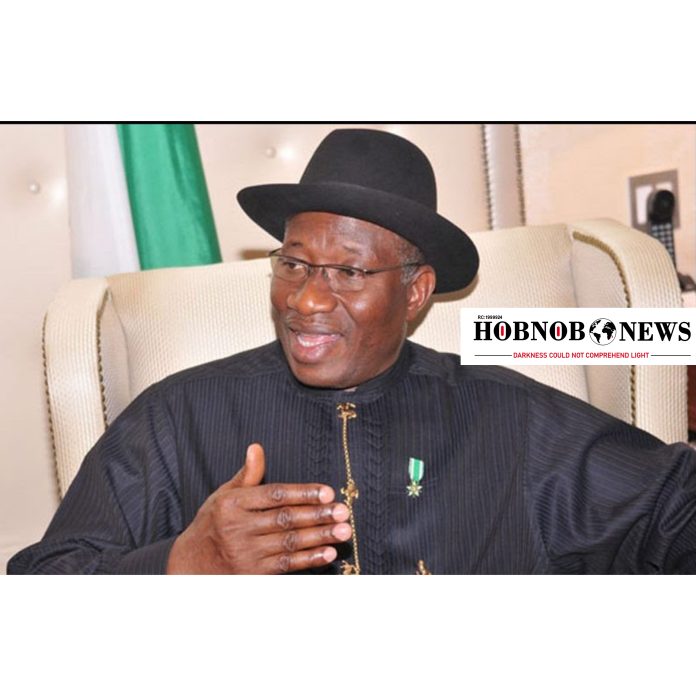By Hobnob News
Former President Goodluck Jonathan has raised concerns over the accuracy of vote counts in Nigeria, attributing the issue to the prevalence of ‘ghost voters’ and other electoral malpractices. Speaking at the YIAGA Africa Reflection Conference on Democratic Elections in West Africa, held in Abuja on Tuesday, Jonathan asserted that the integrity of the Independent National Electoral Commission (INEC) remains questionable due to undue political influence and manipulation.
Jonathan stated that the country’s electoral system is plagued by credibility issues, emphasizing that until INEC is led by individuals who prioritize integrity over political pressure, elections will continue to lack transparency and fairness.
“In Nigeria, you can’t get an accurate count of votes because I believe that we have too many ghost voters,” Jonathan remarked. “We must have credible people. From what former INEC Chairman Attahiru Jega said, political leaders who are domineering will pressure officials to do the wrong thing. But those officials should be willing to resign rather than compromise the democratic process.”
He maintained that without strong-willed and principled leadership within INEC, the country’s democratic future remains uncertain.
INEC Officials Must Uphold Integrity
The former president further stressed that electoral integrity hinges on the willingness of officials to resist external influences. According to him, resigning from their positions rather than yielding to undue political interference would be the most honorable course of action for electoral officials.
“If you accept to be the Chairman of INEC or a Commissioner, you should be ready to stand firm. If you are pressured to do what is wrong, the best course of action is to protect democracy and walk away,” Jonathan advised.
He warned that as long as electoral management bodies consist of individuals who succumb to pressure, Nigeria will continue to experience flawed elections.
The Role of Technology in Elections
Jonathan acknowledged the introduction of technology, such as the Bimodal Voter Accreditation System (BVAS) and the INEC Results Viewing Portal, as an effort to enhance transparency in elections. However, he pointed out that despite these advancements, the 2023 general elections were still marred by logistical failures, delayed voting, violence, and technical glitches. He noted that unless the fundamental issues surrounding voter credibility and electoral processes are addressed, technology alone cannot salvage the country’s electoral system.
“If our electoral system is not fine-tuned to the level where voter cards work effectively, then what is so great about democracy?” Jonathan questioned.
He also warned against the increasing regionalization of elections, which he described as a significant barrier to electing competent leaders. According to him, the practice of aligning political choices along regional and religious lines has contributed to electoral instability.
“Sometimes, when I listen to predictions by religious leaders, their stance is often influenced by regional interests. If the electoral process continues to be this regionalized, we will keep facing major challenges,” he noted.
West Africa’s Democratic Landscape
Jonathan also highlighted electoral challenges in other West African nations, such as Sierra Leone and Senegal, where allegations of voter intimidation, ethnic tensions, and manipulated results have undermined democratic processes. He contrasted this with Ghana, which he commended for conducting peaceful and transparent elections despite limited technological deployment.
He cited Liberia’s 2023 elections as an exemplary case, where former President George Weah conceded defeat to opposition leader Joseph Boakai after a closely contested runoff, setting a positive precedent for democratic transitions in the region.
Jonathan pointed out that countries that relied heavily on technology, such as Nigeria and Sierra Leone, experienced heightened electoral disputes, while those that maintained a balanced approach saw relatively smoother transitions.
“This development underscores the role of the human element in democracy. It shows that deploying technology, no matter how sophisticated, will not deliver the desired results without a genuine commitment by authorities and citizens to uphold integrity,” he said.
A Call for Electoral Reforms and Youth Participation
The former president emphasized that for democracy to thrive in Nigeria and West Africa, electoral reforms must be prioritized. He advocated for strong and independent electoral institutions, robust voter registration systems, and greater youth participation in governance.
He also called on Nigeria to take the lead in organizing credible and peaceful elections, given its influence in the sub-region. “Nigeria must set the right example for West Africa by ensuring its elections are free, fair, and devoid of manipulation,” he insisted.
Despite acknowledging democratic setbacks, particularly the coups in Mali, Burkina Faso, and Niger, Jonathan remained optimistic about the progress of democracy in the region. He noted that West Africa has largely transitioned from an era dominated by military rule to one where elections are the primary means of transferring power.
“The fact that military regimes are now seen as an aberration within the Economic Community of West African States (ECOWAS) shows our determination to uphold democracy,” he said. “It is a departure from the past, when political instability and authoritarian rule were widespread.”
Conclusion
Jonathan reiterated that achieving credible elections in Nigeria and West Africa requires unwavering commitment from electoral bodies, political leaders, and the electorate. He called for ethical leadership, enhanced electoral processes, and responsible use of technology to foster transparency and public trust in the system.
As Nigeria prepares for future elections, Jonathan’s message serves as a critical reminder of the need to uphold democratic values, ensure fair voting processes, and eliminate manipulative influences that threaten electoral credibility.

